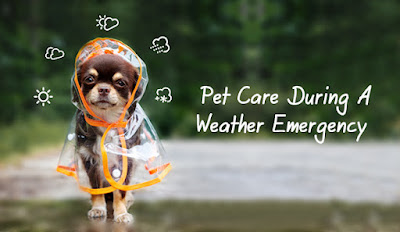Weather emergencies have many names- wildfires, tornadoes, earthquakes, floods, lightning, thunderstorms, blizzards and so on.
Such extreme weather can be a distressing and frightening experience, especially for our pets, who have always felt safe and loved in our warmth.
A responsible pet parent should have a proper plan for their pet’s safety before, during and after any such bad weather.
Before A Weather Emergency
Warnings for severe weather are mostly unanticipated and, hence, when you receive any such alerts, you should be ready with a plan to protect your beloved pets. Here’s what you should do to be prepared for such an event.
Make an evacuation plan
Having a plan to evacuate your pets during weather emergencies will give you peace of mind that your pets will be safe. If you don’t have an evacuation plan, your pets might get left behind and may end up lost, injured or worse.
- Figure out a safe shelter in your area where you can take your pets during such times.
- Locate local animal shelters or animal hospitals near your house where your pets can stay in case of unforeseen events.
- Tell your trusted friends or neighbors about your plan so that they can evacuate your pet in case of an emergency if you are not around.
- Keep a pet emergency kit handy in advance.
Preparing a pet emergency kit
A pet emergency kit is highly essential while preparing for weather emergencies. Here’s the check list for preparing your pet’s emergency kit:
- Pet first aid kit
- Food and water for at least 3 days
- Medication for at least 3 weeks
- Leash and harness
- Crates and carriers
- Vaccination certificates
- Medical records
- Muzzle
- Litter box for cats and plastic poop bag for dogs
- Contact information and address
- Treats and toys to distract them
- Anxiety relievers
- Microchip ID
- A recent photograph of your pet
Other things to remember
- Always make sure that your pet’s ID tags and collars are updated.
- Get your pet microchipped if you haven’t already, as it is the best way to ensure that your pet will reunite with you if they are separated during the chaos.
- Keep the leash, carrier and crates near the exit for easy evacuation.
- Ask your vet for more information on your pet’s medicines, shelter homes and first aid while making an evacuation plan.
During A Weather Emergency
Being prepared for the worst is the best thing to do during a weather emergency or as soon as you receive any alerts of a disaster approaching. Keep these points in mind:
- Tune into the radio or television for weather updates and instructions from local authorities.
- Stay away from windows, poles, glasses and the open sky at the first sign of the disaster.
- Bring your pets indoors and close all the doors and windows in case of floods or hurricanes.
- Turn off the main power supply if needed.
- Use flashlights instead of candles or kerosene as a light source.
- Keep your cell phones and power banks fully charged.
- Keep your friends and relatives informed if you are leaving your home to move to a safer place. Evacuate only if needed, as going out during the “eye of the disaster”, can be dangerous.
- You can contact the local emergency pet helpline to find a shelter if you haven’t figured it out in advance.
- Do not leave your pets alone under any circumstances.
After A Weather Emergency
It may be hours, days, or even a few weeks before you return home or before the weather returns to normal. During this period, you should take the best possible care of your pets as these events might traumatize them.
Also, don’t let them roam freely as the familiar scents and smells might be gone at the end of the weather emergency and your pet may get lost.
If your pet is lost..
Search for a lost pet as soon as possible, but do not venture into unsafe areas. You can also ask for the help of your local authorities or police to help you find them.
If your pet is injured..
Check your pet for injuries or any other problems, as the panic and chaos during these severe conditions may harm your pets. Treat the injuries immediately. Visit a vet if required.
Returning back to normal..
Return to your normal schedule as soon as possible to help your pet recover as they will feel familiar with the routine. Spend more time with your pets to comfort them and everything will fall into place soon.



